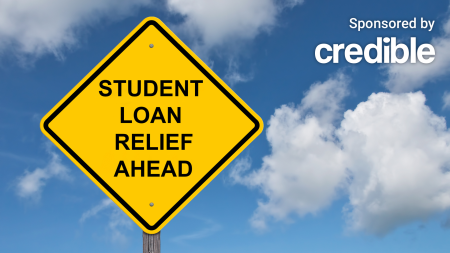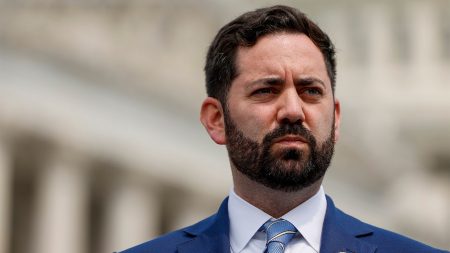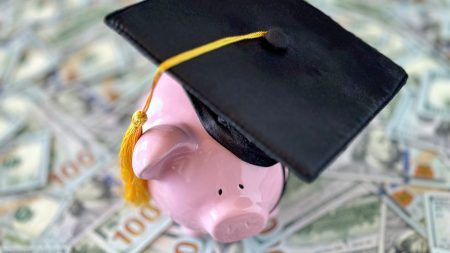Our goal here at Credible Operations, Inc., NMLS Number 1681276, referred to as “Credible” below, is to give you the tools and confidence you need to improve your finances. Although we do promote products from our partner lenders who compensate us for our services, all opinions are our own.
When you have debt with mounting interest charges, it can be easy to get tunnel vision. In many cases, paying off your debt should be your top priority. But being so focused on debt payoff can sometimes make it harder to meet other important financial goals, like building an emergency savings fund to help cover unexpected expenses.
Whether it’s better to pay off debt or save depends on your unique financial situation. Here’s a closer look at when you should prioritize saving versus paying off your debt.
If you’re looking for a debt consolidation loan to help manage your debt, visit Credible to quickly and easily see your prequalified personal loan rates.
Paying down debt vs. saving: Which should you prioritize?
Whether you should prioritize paying down debt or saving can depend on the type of debt you have and the interest rates on each. As tempting as it can be to put any extra dollar you have toward paying off debt, if you don’t have a rainy day fund in place, it could hamper your financial goals. If an expensive emergency does arise — like an unexpected medical or auto repair bill — and you don’t have an emergency fund in place, you may need to take on more debt to cover those unforeseen expenses.
Generally, your first priority should be to save money for emergencies. If you already have money saved up, then you can focus on paying down debt until you’re debt-free.
If you have very high-interest debt or a type of debt with repayment terms that are difficult to manage (like a payday loan), you’ll want to pay that debt down first to avoid paying more interest than necessary.
If you’re still struggling to decide whether to pay down debt or build your emergency savings, look at how much it’ll cost you each month. Take note of how much it costs you to pay down the debt and how quickly you can realistically pay it off.
HOW DO I BUILD AN EMERGENCY FUND?
Reasons to pay off debt
It may make sense to pay off debt before saving in a few situations:
You have a high interest rate
The faster you pay off your debt, the less you’ll pay in interest. If you have high-interest debt, such as credit card debt, you can save a lot of money by focusing on paying off your debt before you save.
You want to improve your credit score
The less debt you have, the lower your credit utilization ratio will be, which can improve your credit score.
The debt is causing you a lot of stress
As helpful as an emergency fund is, if the thought of having debt is keeping you up at night and making your life extremely stressful, it may make sense to prioritize paying it down over saving.
Here’s an example of why paying off debt as quickly as possible can be a solid choice to make.
Let’s say you owe $5,000 on a credit card with a 17% annual percentage rate, or APR. If you only make a minimum monthly payment of $121, it’ll take you five years to pay off the debt and you’ll pay a total of $2,573 in interest.
If you were able to double up on your monthly payments by paying $242 each month, you’d pay off that credit card debt in two years and only pay $958 in interest. You can see how hustling to pay off your debt can make a huge difference financially.
If you have multiple high-interest debts weighing you down, you can consolidate that debt into a debt consolidation loan, which is a type of unsecured personal loan. You’ll pay off your existing debt and then only have one monthly debt payment to manage. If you can get a lower interest rate with the new debt consolidation loan, you can pay off the debt even sooner.
Credible makes it easy to compare personal loan rates from various lenders, all in one place — and it won’t affect your credit score.
Reasons to save
As long as you’re still making the minimum payments on your existing debt, prioritizing saving also has some benefits worth considering. Here are some circumstances where saving before paying off debt might make more sense:
You don’t have emergency savings
Running into an expensive emergency can lead to taking on more debt, which can increase the amount of interest you’ll pay as well as the amount of time it takes for you to become debt-free.
You’re working toward a specific financial goal
If you have an upcoming expense, like a vacation or a down payment for a car, focus on setting aside money to cover your financial goal so that you don’t have to go deeper into debt to pay for it.
You have a chance to earn compound interest
Money you save can earn more money for you. When you put money in a savings account, certificate of deposit, money market account or investment account, you can earn interest that compounds and grows over time. The earlier you can start saving, the more time that interest has to compound and the more money you can earn.
For example, let’s say you put $500 into a retirement account and invested $500 a month for five years with a 7.5% return. If that interest compounded annually, you’d have $35,568 at the end of five years.
HOW DO HIGH-YIELD SAVINGS ACCOUNTS WORK?
You don’t have an emergency fund
An emergency fund is an important safety net to have in case an unexpected cost occurs. Here’s how to build one:
- Add up your living expenses. A good rule of thumb for an emergency fund is to save six months’ worth of living expenses. That way, if you lose your job, you can still afford the necessities. If you’re employed and an emergency arises, that fund will likely be expansive enough to cover the unexpected costs.
- Make a savings plan. Once you know how large you want your emergency fund to be, you can figure out how much you can afford to contribute to the fund each month. Add that amount to your monthly budget and stick to it like you would any necessary expense.
- Open a high-interest savings account. Don’t leave your emergency fund savings in your checking account or regular savings account. Look for a high-interest savings account to open and store your emergency fund there so that you have interest compounding and growing your savings for you.
Strategies to pay off debt
Many strategies are available to help you pay off debt. Here are a few common ones to consider:
Use a balance transfer credit card or debt consolidation loan
Combining your high-interest debt into one source such as a debt consolidation loan, ideally with a lower interest rate, can streamline your monthly payments and make it easier to focus on your debt repayment efforts.
Work with a nonprofit credit counselor
You can book a free consultation through the National Foundation for Credit Counseling and receive personalized debt payoff advice.
Consider the debt snowball or debt avalanche repayment methods
The debt avalanche method involves paying down your highest-interest debt first (while making minimum payments on all your other debts), which will save you the most money on interest. With the debt snowball method, you pay off your smallest balance first, which can be more motivating since your balances will disappear more quickly.
If a debt consolidation loan is the right debt repayment strategy for you, use Credible to see your prequalified personal loan rates and pick the loan option that works best for your needs.
Strategies to save
If you want to focus on saving, these strategies can get you started:
Create a budget
Making a budget and sticking to it will help you keep yourself accountable, avoid overspending, and develop better saving and spending habits.
Cut down your largest monthly expense
While it may be challenging, see if you can cut back on your biggest monthly expense. If it’s rent, maybe you can move to a less expensive apartment or get a roommate to help share expenses. If your car lease is sky-high, consider buying a used car when it ends. See what’s eating away at your budget and how you can make more room for savings.
Negotiate your bills
Some bills, like cable and WiFi, are more negotiable than you might think. See if you can negotiate some better deals for any recurring monthly expenses, giving you more money to put toward savings.
WHAT IS THE 50/30/20 BUDGET RULE?
Can you pay off debt and save at the same time?
It’s possible to work toward paying off debt and saving at the same time, but it’s important to plan and come up with a strategy that will benefit you.
For example, maybe you can set a budget that includes both saving and paying off debt — like contributing $300 to paying off debt and $100 to savings each month. As you pay down more of your debt, you can allocate more money to saving and get closer to achieving your financial goals.
Read the full article here















